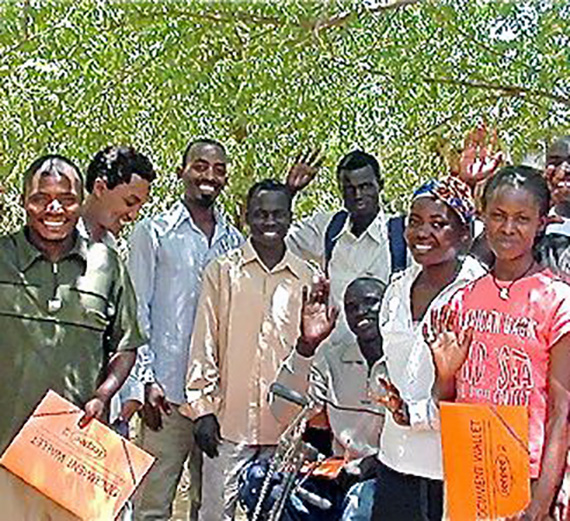GU Takes Lead Role in Educating Marginalized Masses

By Peter Tormey
SPOKANE, Wash. — From a cottage on the Gonzaga University campus, Mary McFarland, Ph.D., serves as international director for Jesuit Commons: Higher Education at the Margins, an ambitious new four-year pilot launched in fall 2010 in partnership with Jesuit Relief Services. The students are refugees from eight countries and live at camps in Malawi and Kenya with urban refugees in Syria.
Using Skype, McFarland speaks with team members in Rome, Kenya, Malawi and Syria. Faculty teaching in the program "without fail, say they've learned more than their students," said McFarland, who stepped down as dean of Gonzaga's School of Professional Studies to lead the pilot funded by an anonymous donor.
One recent morning, McFarland was saddened to hear life had become even more difficult for students and teachers in Aleppo, Syria, where blackouts had become routine. Administrators worried no one would attend a night session in the cold, dark classroom. They had underestimated the refugees' desire to learn.
"Promptly at 6 p.m., every single student in the track showed up for class, as did the teachers," said McFarland, who spends five months per year with refugees on-site and works from Gonzaga the rest of the year. "Class went on by candlelight. At each of the sites we experience this kind of hunger for education."
The potential is enormous for the effort to significantly help educate the world's marginalized masses. The project is part of Jesuit Commons, an outgrowth of the 35th General Congregation - the last worldwide meeting of the Society of Jesus. Pope Benedict XVI encouraged Jesuits to reach out "to the margins" to engage and educate a secular world. Jesuit Commons leverages the collaborative potential of the Jesuits' and lay partners' network that serves millions in more than 100 countries. The network aims to bring Jesuit higher education to many of the world's poorest people, empowering millions to eradicate poverty.
Gonzaga and Regis University in Denver have assumed lead roles in the initiative.
"What's so exciting," McFarland says, "is that we are giving our universities and the refugee students a chance to work together to build an entirely new and dynamic global network of Jesuit higher education for those at the margins." McFarland has developed a global team including the Jesuit Distance Education Network (JesuitNet), 12 (of 28) U.S. Jesuit universities, and colleagues in Italy, Africa, Syria, Jordan, Thailand and South Africa.
The latest online tools deliver accredited university courses to refugees with little, if any, postsecondary education. Jesuit Refugee Service provides on-site coordination and expertise. Regis is the credentialing institution, while Gonzaga has found and delivered low-cost network resources and other support. Microsoft donated software and licenses; faculty at Gonzaga and other U.S. Jesuit universities teach without pay.
Jesuit pedagogy transforms — liberating the mind and the spirit, said McFarland, who earned a doctorate at Gonzaga. "This project seeks — in partnership with those living at the margins — to teach, to learn, and to help transform the world," she said.
When the pilot ends post-2014, McFarland predicts "we will have a more developed model and a broader reach to the margins of the world and involving Jesuit universities in Latin America and worldwide."
